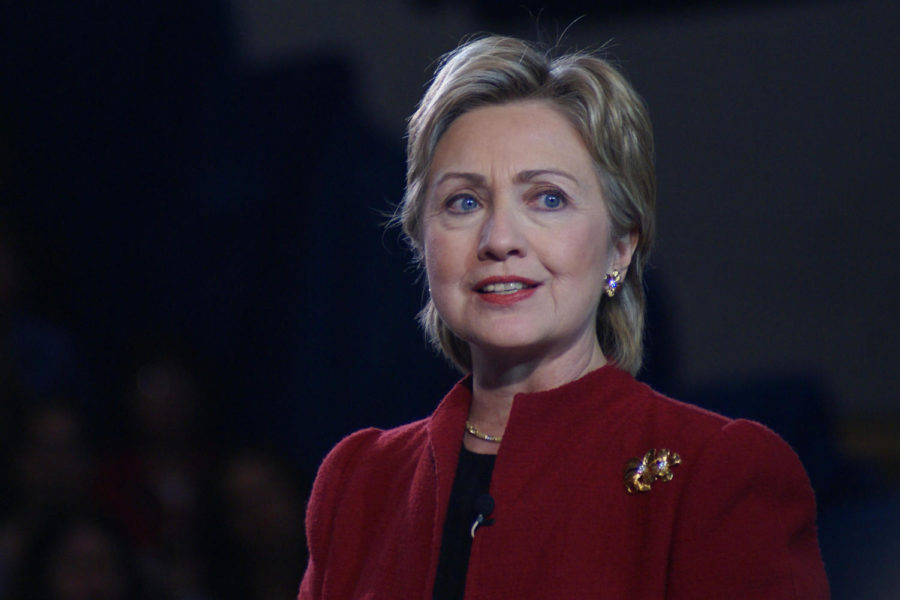Cummings: Why we need a female president
In a poll by NBC News, Hillary Clinton was cast to win the 2016 presidential election over Chris Christie; however, women still face adversity in the political realm, especially when faced with sexist remarks, propaganda and slander from fellow politicians in the media.
November 19, 2013
“Hillary Clinton, 2016 presidential candidate, is to become the first female president of the United States.”
Unfortunately, this sentence – or any sentence like this – has yet to be uttered.
Though Clinton has not yet officially stated whether or not she plans to run for president in 2016, a recent poll conducted by NBC News found that in a hypothetical presidential race between Clinton and unofficial candidate Chris Christie, Clinton would come out the victor.
Whether most citizens are Hillary fans or not, the United States should be proud of the strides being made toward accepting females holding political office. Sadly though, this pride is not shared by everyone, and there are those who wish to continue discouraging women for their political efforts.
Earlier this year, Omaha, Neb.’s current mayor Jean Stothert faced the embarrassment of dirty politics when t-shirts were made depicting her in an inappropriate manner during her run for office.
Printed on the front of the shirts was a drawing of Stothert as a voluptuous stripper hanging from a pole, with the words “Jean, Quit Stripping Us Of Our Tax Dollars!!!” in big letters on the side. A small box near the bottom of the shirt states they were “sponsored” by “Suck My Private Sector.”
To make matters worse, her fellow Omaha City Council member Chris Jerram was photographed holding the shirt at a local tavern. Though he claimed to have had no part in the production of the shirts and to not have known what exactly was on the shirt when he posed with it, Jerram played a significant role in the kind of sexist mocking women frequently experience.
Though whoever made the shirts had the right to express their political opinion, the fact that it was expressed in such a degrading manner is what was so offensive to Stothert.
“It’s not only demeaning to me, it’s demeaning to women,” Stothert said, as quoted by a local news station.
Stothert is right. Though the shirts were a political attack on Stothert, they had other social effects on the people who saw them. The depiction of Stothert as a stripper only helped to further society’s wrong assumption that women can be thought of as sexual objects.
Though the crude and unnecessary debasing of politicians seems to be somewhat commonplace in the United States, especially during major political races, it is difficult to imagine a man being reduced to a sexual object in the opposition to his campaign.
But Stothert is not the only one who has been discouraged from running for office for reasons relating to her sex.
Few can forget the slew of sexist comments former Alaska governor Sarah Palin received when she was campaigning for the 2008 vice presidential seat alongside presidential candidate John McCain.
Among other insults, Palin’s reliability as a candidate was called into question as voters wondered whether or not Palin would have time to help run a country when she has a family to raise as well. As no male candidate would ever have his ability to manage both a country and a family questioned, these doubts about Palin could only stem from two areas of thought: a man is more equipped to handle both political and familial duties, or a woman is best left at home.
In 1995, Wal-Mart pulled a “Someday a Woman will be President!” t-shirt from its shelves because it violated the company’s “family values.” Just shy of 20 years later, it doesn’t appear that much has changed in society’s view of women.
Politicians are figures of authority, and whether we like to believe it or not, how they present themselves and how they are treated does have some effect on how we view society around us. Witnessing the unnecessarily sexist treatment of female politicians is likely to offend some and make others believe that kind of treatment is OK.
If there is no authoritative role model for young girls to look up to, a female in power who was elected because her country finally realized how wrong it had been, then what will their future be like? Will they feel discouraged when they see women applying for “men’s jobs” or doing “male activities,” only to receive a backlash of hate for doing so?
Let us change the way America views female politicians, not just for their ethical treatment, but for the treatment of all women.
In 2008, the United States elected its first African-American president. In 2016, we may have the chance to redeem history once again. Who will you be rooting for?

















